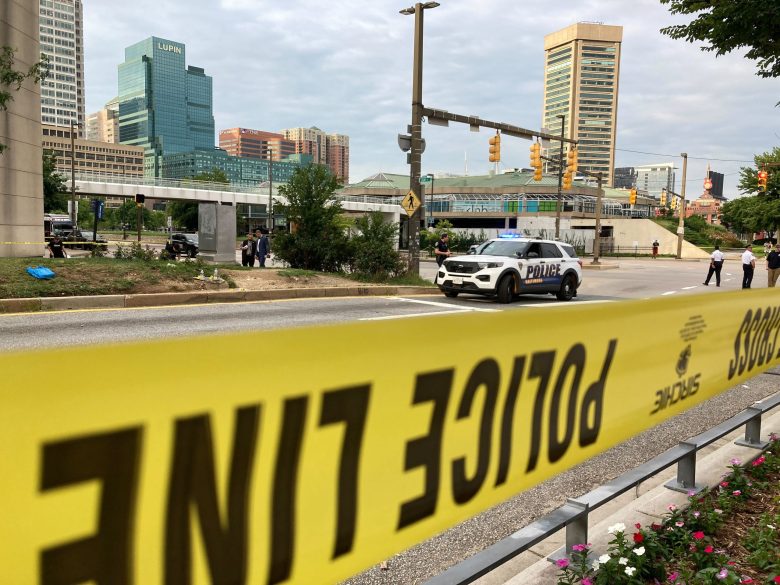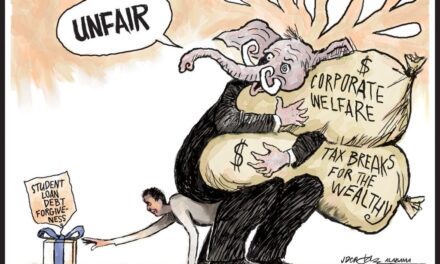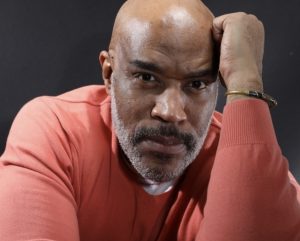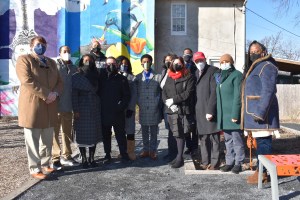By LEA SKENE, Associated Press
BALTIMORE (AP) — A Baltimore teenager acted in self-defense when he allegedly shot and killed a baseball bat-wielding driver who approached youths washing windshields at a busy downtown intersection last summer, attorneys for the teen argued as his murder trial got underway Tuesday.
The high-profile tragedy reignited longstanding debate about Baltimore’s squeegee workers, mostly Black youths from disadvantaged backgrounds looking to make fast cash. City leaders have since banned the practice at certain high-traffic intersections and stepped up efforts to connect squeegee workers with above-board job opportunities.
“The state would have you believe this case is about squeegee boys,” defense attorney J. Wyndal Gordon told jurors in his opening statement. “This case is about road rage.”
Timothy Reynolds, 48, died from gunshot wounds after the July 2022 confrontation in evening rush hour near Baltimore’s Inner Harbor. An engineer and father of three, he grew up in the Baltimore area and was an avid fan of the city’s major league sports teams.
Defense attorneys argued Reynolds was the aggressor, his anger fueled by a longstanding irritation with squeegee workers whose presence at downtown intersections dates back decades.
“Mr. Reynolds’ personal views triggered him, and it led to an unprovoked attack on children,” Gordon said. “He took the law into his own hands and it ended poorly for him.”
But prosecutors gave jurors a different narrative of the moments preceding Reynolds’ death.
“He was out-maneuvered and he was gunned down,” prosecutor Cynthia Banks said, counting off the five gunshots that wounded him, including three to his back. “You cannot overlook the fact that Mr. Reynolds was shot dead.”
In turn, prosecutors told the jury that something got under Reynolds’ skin that afternoon and elicited a strong reaction. “The fact is he was upset, he was mad, he was human,” Banks said.
It’s not clear exactly what caused Reynolds to confront the squeegee workers he encountered. But he drove through the intersection and parked his car haphazardly, grabbed a metal baseball bat from the trunk and marched across several lanes of traffic toward the group, according to court testimony.
His mother was among several relatives who sat through Tuesday’s proceedings, her face twisting with grief during testimony about the minute details of the shooting.
The defendant, who faces first-degree murder and other charges, turned 15 the day after the shooting. He’s being tried in adult court, but The Associated Press is withholding his name because he’s a minor.
His attorneys repeatedly emphasized the difference in size between the defendant and Reynolds, who was 6 foot 3 (1.9 meters) tall and over 300 pounds (135 kilograms).
“You know who the adult was? Mr. Reynolds,” Gordon said, arguing Reynolds wasn’t acting his age.
One of the witnesses who testified Tuesday was a UPS driver who happened to pass through the intersection when the confrontation occurred. He said Reynolds swung the bat toward one squeegee worker moments before another opened fire. He said he couldn’t tell whether Reynolds struck anyone with the bat and couldn’t hear any words exchanged.
No witnesses positively identified the defendant as the shooter, saying they couldn’t be sure about his appearance because he was wearing a facemask. Multiple witnesses said they thought the shooter was wearing a pink shirt at the time.
Police later found a backpack nearby that contained a loaded handgun.
Another witness testified she was sitting in her car outside a nearby apartment building that evening when she saw a young man take off a pink shirt and don a mask that covered most of his face. She also said she couldn’t positively identify the defendant.
The teen appeared in court Tuesday wearing a gray suit, his shackles clanking loudly as he entered the room. His attorneys acknowledged he looked visibly older than when he was arrested last summer: taller and broader with facial hair beginning to come in.
“Some people would have you believe his name is squeegee worker, but he has a real name. He’s a real human being,” Gordon told the jury, saying his client dreamed of becoming an engineer or lawyer someday.
The attorney’s comments alluded to the heated debate around squeegee work that has long divided Baltimoreans. To some, the windshield washers are hard-working entrepreneurs facing some of Baltimore’s most deep-seated social challenges, including poverty, racism and disinvestment in communities of color; others consider them a nuisance and public safety hazard.
Since the city launched a campaign to address squeegeeing in response to the shooting, squeegee workers have been few and far between at most downtown intersections and officials have reported increased numbers of them taking advantage of social services and job-placement programs.
The trial is set to continue Wednesday in Baltimore Circuit Court.
The post Baltimore squeegee worker on trial for murder acted in self-defense in motorist’s death, lawyer says appeared first on AFRO American Newspapers .










